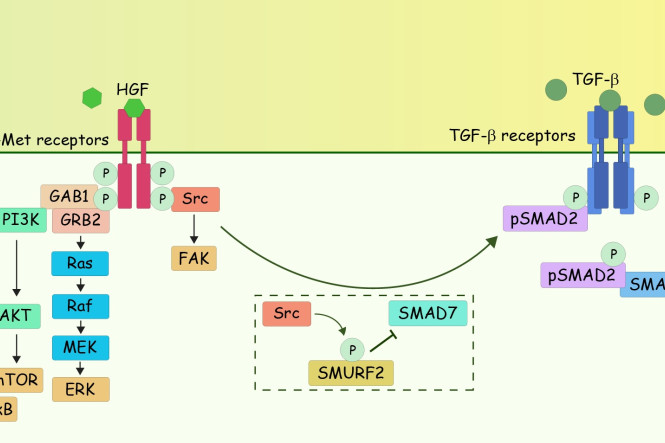Prasanna Vasudevan Iyengar has a publication in Nature communications.
c-Met activation leads to the establishment of a TGFβ-receptor regulatory network in bladder cancer progression
Sim WJ*, PV Iyengar*, Lama D, Lui Kit Leng S, Ng HC, Gelibter LH, Domany E, Kappei D, Tan TZ, Saie A, Jaynes PW, Verma CS, Kumar AP, Rouanne M, Ha HK, Radulescu C, ten Dijke P, Eichhorn PJA, Thiery JP
Nature Communications, September 2019
* Shared co-first authors
Abstract:
Urothelial carcinoma is the fifth most common cancer in the EU and it is one of the most difficult (and expensive) cancers to treat due to its high rate of reoccurrence in patients. Poor prognosis and mortality rate is often linked to formation of secondary tumour sites. Its treatment and lack of precise diagnostic biomarkers remain major clinical challenges. Aberrant hepatocyte growth factor (HGF)/c-MET receptor signalling activation is frequently observed in bladder cancer tumours correlating with cancer progression and metastasis, unfortunately targeting these receptors have failed to show promise in the clinic due to resistance mechanisms and potential downstream cross-talks with other pathways. In our study, we set out to identify the precise mechanisms underlying HGF/c-MET mediated invasion in bladder cancer. Thereafter, using biologically relevant orthotopic mouse models we show that inhibition of TGF-beta pathway prevents HGF induced bladder cancer invasion. Furthermore, we make a rationale for the use of a combinatorial treatment of TGF-beta receptor kinase and MEK inhibitors in the treatment of high grade non-muscle-invasive bladder cancers or early stage muscle-invasive bladder cancers.
The Publication can be found here or here.
